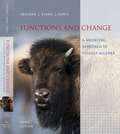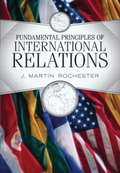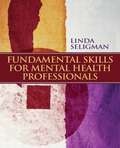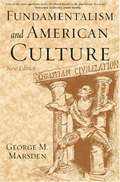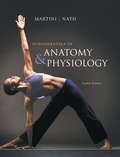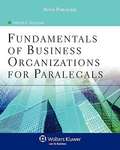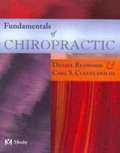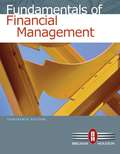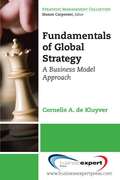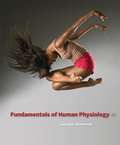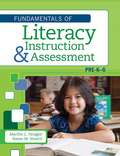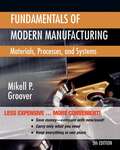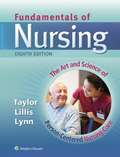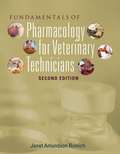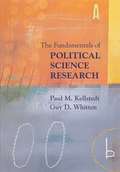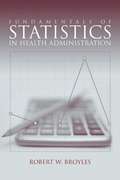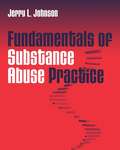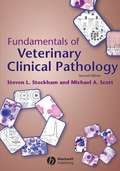- Table View
- List View
Functions and Change: A Modeling Approach to College Algebra (3rd Edition)
by Bruce Crauder Benny Evans Alan NoellThis edition provides an alternative to a traditional college algebra course for students who either will not take another math course or may go on to a business calculus course. An informal approach offers clear explanations that leave out unnecessary technicalities so that students who are not comfortable with algebra will easily understand the concepts.
Fundamental Principles of International Relations
by J. Martin RochesterThis book distills the essential elements of world politics, both the enduring characteristics as well as the revolutionary changes that may be altering the very fabric of the centuries-old state system. Author J. Martin Rochester explores all the important topics that one would expect to find in an IR text (war, diplomacy, foreign policy, international law and organization, the international economy, and more) but injects fresh perspectives on how globalization and other contemporary trends are affecting these issues. In addition, the author does so through a highly engaging, lively writing style that will appeal to today's students. Fundamental Principles of International Relations is a tightly woven treatment of international politics past and present, drawing on the latest academic scholarship while avoiding excessive jargon and utilizing pedagogical aids while avoiding clutter. Rochester ultimately challenges the reader to think critically about the future of a post-Cold War and post-9/11 world that is arguably more complex, if not more dangerous, than some previous eras, with the potential for promise as well as peril.
Fundamental Skills for Mental Health Professionals
by Linda SeligmanThis book is intended to help students and novice clinicians, as well as more experienced clinicians, in the mental health professions of counseling, psychology, and social work to develop competence in the fundamental skills of their profession. With a solid grounding in such skills as effective use of questions, reflection of feelings, eliciting and modifying dysfunctional thoughts, and behavioral change strategies, clinicians can both acquire a sound understanding of their clients and develop strong helping skills.
Fundamentalism and American Culture (2nd edition)
by George M. MarsdenMany Americans today are taking note of the strong political force that is the religious right. Controversial decisions by the government are met with hundreds of lobbyists, millions of dollars of advertising spending, and a grassroots response.
Fundamentals of Air Pollution Engineering
by Richard C. Flagan John H. SeinfeldA rigorous and thorough analysis of the production of air pollutants and their control, this text is geared toward chemical and environmental engineering students. Topics include combustion, principles of aerosol behavior, theories of the removal of particulate and gaseous pollutants from effluent streams, and air pollution control strategies. 1988 edition.
Fundamentals of Anatomy & Physiology (8th Edition)
by Frederic H. Martini Judi L. NathThis textbook will serve as an introduction to the inner workings of your body, providing information about both its structure and its function.
Fundamentals of Business Organizations for Paralegals (3rd Edition)
by Deborah E. BouchouxFundamentals of Business Organizations for Paralegals, Third Edition, offers a concise treatment of all of the forms of business organizations in the United States. The author provides thorough, succinct treatment of all pertinent topics, making this book the ideal choice for instructors who teach a shorter course and need a text that covers critical topics with a more straightforward approach. Attentive To The fundamentals paralegal students need to know, this concise paperback provides: a basic and thorough understanding of all the various types of business organizations in a direct and concise format a discussion of each form of business organization, including the nature of the entity, advantages and disadvantages, formation of the entity, operation and management, transferability of ownership, dissolution, and tax consequences more in-depth treatment of Limited Liability Partnerships and Limited Liability Companies than other texts useful exhibits and charts that highlight important topics and sample forms that are integrated with the textual discussion throughout the book Internet resources in each chapter that direct readers to Internet sites that may provide additional information, forms, or agreements Key Terms defined in the margins for easy reference, practice tips in each chapter that provide pragmatic information for paralegals, lists of relevant websites and of tasks commonly performed by paralegals, and a complete glossary that provides an easy reference for terminology Case Illustrations -- brief summaries of cases that illustrate one of the concepts or topics addressed in the chapter Discussion Questions in each chapter that stimulate class discussion and ensure that students Understand The material a complete ancillary package, including an instructor's manual with a test bank and PowerPoint slides. The Instructor's Manual will also provide additional forms, such as tax forms, not included in the text New to Third Edition: each chapter includes all new discussion questions, Internet questions, and Case Illustrations Chapter 6 discusses Revised Uniform Limited Liability Company Act Chapter 10 discusses new trends in corporate governance, such as the move toward electing boards of directors by majority rather than plurality vote, The move toward eliminating staggered or classified boards of directors, new SEC rules and regulations, And The availability of proxy materials on the Internet coverage of the 2008 financial crisis Clear and To The point, Fundamentals of Business Organizations for Paralegals is an excellent, concise treatment of the basics of business organizations, providing students with a thorough understanding of essential topics.
Fundamentals of Chiropractic
by Daniel Redwood Carl S. Cleveland Marc MicozziThis textbook introduces and explains basic chiropractic philosophy and history, principles, and applications in practice. In addition to covering chiropractic care techniques, it also discusses anatomy, biomechanics, and physiology, as well as spinal analysis and diagnostic procedures. Key scientific and philosophical issues within the chiropractic community are addressed. Clearly presented material in an easy-to-follow format defines unfamiliar terms, explains and illustrates concepts, and reinforces ideas through review and critical thinking questions. The book's broad scope and discussions of diverse topics make it ideal for students or anyone in the chiropractic community. Topics and content parallel the test plan outlines from the National Board of Chiropractic Examiners, ensuring that all material is relevant, up-to-date, and accurate. Well-known chapter contributors - some of the most respected and influential names in the field - give the book a balanced approach, reflecting the diversity within the profession on issues related to the science and philosophy of chiropractic. Well-referenced discussions include the most up-to-date research. Key terms and critical thinking/review questions in each chapter familiarize the reader with important concepts and promote a solid understanding of the material.
Fundamentals of College Algebra (10th Edition)
by Earl William Swokowski Jeffrey A. ColeThis textbook introduces two-dimensional graphs, polynomial, inverse, exponential, and logarithmic functions, and methods for solving systems of inequalities and plane geometry. Keystroke instructions for the TI-83 Plus and TI-86 calculators are provided throughout. The eleventh edition features 100 new examples and exercises. Annotation ©2004 Book News, Inc., Portland, OR (booknews.com)
Fundamentals Of Corporate Finance (Eight Edition)
by Richard Brealey Stewart Myers Alan MarcusFundamentals of Corporate Finance, by Brealey, Myers and Marcus, provides students with a solid framework of theory and application to use well after they complete the course. This author team is known for their outstanding research, teaching efforts, and world-renowned finance textbooks, so it's no surprise that they provide clear exposition of difficult material without sacrificing up-to-date, technically correct treatments. And with the Eighth Edition, McGraw-Hill's adaptive learning component, LearnSmart, provides assignable modules that help students master chapter core concepts and come to class more prepared. In addition, resources within Connect help students solve financial problems and apply what they've learned. Brealey's personable writing style and world-leading content combine with a complete digital solution to help students achieve higher outcomes in the course. Connect is the only integrated learning system that empowers students by continuously adapting to deliver precisely what they need, when they need it, and how they need it, so that your class time is more engaging and effective.
The Fundamentals of Ethics (2nd Edition)
by Russ Shafer-LandauIn The Fundamentals of Ethics, Second Edition, author Russ Shafer-Landau employs a uniquely engaging writing style to introduce students to the essential ideas of moral philosophy. Offering more comprehensive coverage of the good life, normative ethics, and metaethics than any other text of its kind, this book also addresses issues that are often omitted from other texts, such as the doctrine of doing and allowing, the doctrine of double effect, ethical particularism, the desire-satisfaction theory of well-being, and moral error theory. Shafer-Landau carefully reconstructs and analyzes dozens of arguments in depth, at a level that is understandable to students with no prior philosophical background. NEW TO THE SECOND EDITION: * Discussion questions at the end of every chapter provide students with immediate ways to test their understanding of the material * New, real-life extended examples reinforce the importance of the theories discussed in Chapters 4, 7, 9, 10, 14, 15, and 19 * Greatly expanded coverage of moral rights (in Chapter 8) and of membership in the moral community (in Chapter 9) * A new discussion of skepticism about morality in the Introduction * An Instructor's Manual and Testbank on CD and a Companion Websiteatwww. oup. com/us/shafer-landau Ideal for courses in introductory ethics and contemporary moral problems, this book can be used as a stand-alone text or with the author's companion reader,The Ethical Life: Fundamental Readings in Ethics and Moral Problems,Second Edition, which offers original readings on ethical theory and contemporary moral problems.
Fundamentals of Financial Management (Thirteenth Edition)
by Eugene F. Brigham Joel F. HoustonWith the same contemporary approach and dynamic examples that made previous editions so popular, this fully revised thirteenth edition of FUNDAMENTALS OF FINANCIAL MANAGEMENT continues to provide students with a focused understanding of today's corporate finance and financial management.
Fundamentals of Fluid Power Control
by John WattonThis exciting new reference text is concerned with fluid power control. It is an ideal reference for the practicing engineer and a textbook for advanced courses in fluid power control. In applications in which large forces and/or torques are required, often with a fast response time, oil-hydraulic control systems are essential. They excel in environmentally difficult applications because the drive part can be designed with no electrical components and they almost always have a more competitive power/weight ratio compared to electrically actuated systems. Fluid power systems have the capability to control several parameters, such as pressure, speed, position, and so on, to a high degree of accuracy at high power levels. In practice there are many exciting challenges facing the fluid power engineer, who now must preferably have a broad skill set.
Fundamentals of Global Strategy
by Cornelis A. de KluyverThis book looks at the opportunities and risks associated with staking out a global competitive presence and introduces the fundamentals of global strategic thinking. We define crafting a global strategy in terms of change: how a company should change and adapt its core (domestic) business model to achieve a competitive advantage as it expands globally. The conceptual framework behind this definition has three fundamental building blocks: a company's core business model, the various strategic decisions a company needs to make as it globalizes its operations, and a range of globalization strategies for creating a global competitive advantage. A business model is defined in terms of four principal components: (a) market participation--who its customers are, how it reaches them and relates to them; (b) the value proposition--what a company offers its customers; (c) the supply chain infrastructure--with what resources, activities and partners it creates its offerings; and finally, (d) its management model--how it organizes and coordinates its operations. Globalization requires a company to make strategic decisions about each component of the business model. Market participation decisions include choosing which specific markets or segments to serve, domestically or abroad; what methods of distribution to use to reach target customers; and how to promote and advertise the value proposition. Globalization decisions about the value proposition touch the full range of tangible and intangible benefits a company provides to its customers (stakeholders). Decisions about a company's value chain infrastructure deal with such questions as, What key internal resources and capabilities has the company created to support the chosen value proposition and target markets? What partner network has it assembled to support the business model? How are these activities organized into an overall, coherent value creation and delivery model? Finally, strategic decisions about the global management dimension are concerned with a company's choices about a suitable global organizational structure and decision-making process. We use Pankaj Ghemawat's well-known "AAA Triangle" framework to define three generic approaches to global value creation. Adaptation strategies seek to increase revenues and market share by tailoring one or more components of a company's business model to suit local requirements or preferences. Aggregation strategies focus on achieving economies of scale or scope by creating regional or global efficiencies; they typically involve standardizing a significant portion of the value proposition and grouping together development and production processes. Arbitrage is about exploiting economic or other differences between national or regional markets, usually by locating separate parts of the supply chain in different places.
Fundamentals of Guided-Wave Optoelectronic Devices
by William S. C. ChangOptoelectronic guided-wave devices are used in a wide range of optical fiber communication and optoelectronic systems. In such networks, the electrical and the optical characteristics of guided-wave devices, and the interplay between them, have a profound effect on system design and overall performance. Uniquely, this book combines both the optical and electrical behavior of guided-wave optoelectronic devices so that the interwoven properties, including interconnections to external components, are easily understood. It provides the key concepts and analytical techniques that readers can apply to current and future devices. It also presents the impact of material properties on guided-wave devices, and emphasizes the importance of time-dependent interactions between electrical and optical signals. This is an ideal reference for graduate students and researchers in electrical engineering and applied physics departments, as well as practitioners in the optoelectronics industry.
Fundamentals of Human Physiology (Fourth Edition)
by Lauralee SherwoodThis edition provides scientifically sound coverage of the fundamental concepts of physiology and incorporates pedagogical features that make it interesting and comprehensible.
Fundamentals of Literacy Instruction and Assessment, Pre-K-6
by Martha C. Hougen Susan M. SmarttHougen (College and Career Readiness Initiative: English/Language Arts Faculty Collaborative, U. of Texas-Austin) and Smartt (National Comprehensive Center for Teacher Quality, Vanderbilt U. ) compile 17 chapters by education scholars and researchers from the US who introduce pre-service teachers and parents to teaching fundamental literacy skills in students in pre-K through sixth grade. Chapters are organized by the main components of reading instruction and the typical development of skills, from phonological awareness to fluency to writing, and include recommended assessment practices, in addition to chapters on literacy in the disciplines and current laws, policies, initiatives, and response to intervention. They end with chapters on putting it all together and tips for becoming an effective teacher. They refer to the most recent standards, including Common Core State Standards, the International Reading Association Standards for Reading Professionals, and The International Dyslexia Association Knowledge and Practice Standards for Teachers of Reading. Annotation ©2012 Book News, Inc. , Portland, OR (booknews. com)
Fundamentals of Modern Manufacturing: Materials, Processes, and Systems,Fifth Edition
by Mikell R GrooverFundamentals of Modern Manufacturing: Materials, Processes, and Systems, 5th Edition, is designed for a first course or two-course sequence in Manufacturing at the junior level in Mechanical, Industrial, and Manufacturing Engineering curricula. Given its coverage of engineering materials, it is also be suitable for Materials Science and Engineering courses that emphasize Materials Processing. In addition, it may be appropriate for technology programs related to the preceding engineering disciplines. Most of the books content focuses on Manufacturing Processes (about 65% of the text), but it also covers Engineering Materials and Production Systems.
Fundamentals of Nursing: The Art and Science of Person-Centered Nursing Care
by Carol Taylor Carol Lillis Pamela Lynn Priscilla LemoneThis book intends to help nursing students to develop the blended competencies (cognitive, technical, interpersonal, and ethical/legal) they will need to effectively care for patients in both institutional and community-based practice settings.
Fundamentals of Pharmacology for Veterinary Technicians (2nd Edition)
by Janet Amundson RomichBuild a strong foundation for understanding how medications may help or potentially harm animals. FUNDAMENTALS OF PHARMACOLOGY FOR VETERINARY TECHNICIANS, 2E, follows a body-systems approach making it easy to correlate basic anatomy and physiology with the drugs used to treat diseases of each body system. A strong foundation of drug administration, pharmacokinetics, measurement systems, as well as drug approval and safety provides the concepts necessary to understand drug actions and safe drug administration. A StudyWARETM CD-ROM accompanies the book which provides additional practice via quizzes or games.
The Fundamentals of Political Science Research
by Paul M. Kellstedt Guy D. WhittenPaul M. Kellstedt's and Guy D. Whitten's The Fundamentals of Political Science Research provides an introduction to the scientific study of politics, supplying students with the basic tools needed to be both critical consumers and producers of scholarly research in political science. The book begins with a discussion of what it means to take a scientific approach to the study of politics. At the core of such an approach is the development of causal theories. Because there is no magic formula by which theories are developed, the authors present a series of strategies and develop an integrated approach to research design and empirical analyses that allows students to determine the plausibility of their causal theories. The text's accessible presentation of mathematical concepts and regression models with two or more independent variables is a key component to this process, along with the integration of examples from political science and the real world to help students grasp the fundamental concepts.
Fundamentals of Statistics in Health Administration
by Robert W. BroylesFundamentals of Statistics in Health Administration fills the needs of both students and practicing health care managers who must apply statistical concepts and methods to real world health care management problems and issues. It covers the fundamentals of statistics in a user-friendly way, with a strong emphasis on practical application in health administration. The text is highly structured with step-by-step instructions throughout. There is an emphasis on Excel and other commonly used programs, although manual calculations are given careful attention as well.
Fundamentals of Substance Abuse Practice
by Jerry L. JohnsonProviding a text for undergraduate and entry-level graduate students in social work, and a resource for practitioners, Johnson shows how to gather and use multi-systemic and multi-level client data for assessing and treating substance abuse in individuals and families. Johnson, a practitioner with more than 20 years in substance abuse practice, begins with an overview of the field including prevalence of substance abuse problems and definitions of use, abuse and addiction. Additional chapters describe the effects of specific drugs, prominent theories and models for practice, methods for client engagement and communication, the influence of the community on individuals and families seeking substance abuse services, and strategies for multi-systemic treatment planning. Annotation (c)2003 Book News, Inc., Portland, OR (booknews.com)
Fundamentals of Veterinary Clinical Pathology (Second Edition)
by Steven L. Stockham Michael A. ScottThis book provides in-depth information about common clinical laboratory assays that are used to evaluate domestic mammals, including what assays measure, sample or assay conditions that affect results, and what results indicate about the physiologic or pathologic state of a patient. Whenever possible, diseases and conditions are grouped by common mechanisms or processes to promote a conceptual understanding of laboratory data that can be generally applied across many species. New to the second edition are additional disorders, diagnostic tests, illustrations, images, references, and pathophysiologic explanations. This text has proven valuable to students and veterinarians wanting a fundamental understanding of veterinary clinical pathology.
Funny Farm: My Unexpected Life with 600 Rescue Animals
by Laurie ZaleskiAn inspiring and moving memoir of the author's turbulent life with 600 rescue animals.Laurie Zaleski never aspired to run an animal rescue; that was her mother Annie’s dream. But from girlhood, Laurie was determined to make the dream come true. Thirty years later as a successful businesswoman, she did it, buying a 15-acre farm deep in the Pinelands of South Jersey. She was planning to relocate Annie and her caravan of ragtag rescues—horses and goats, dogs and cats, chickens and pigs—when Annie died, just two weeks before moving day. In her heartbreak, Laurie resolved to make her mother's dream her own. In 2001, she established the Funny Farm Animal Rescue outside Mays Landing, New Jersey. Today, she carries on Annie’s mission to save abused and neglected animals.Funny Farm is Laurie’s story: of promises kept, dreams fulfilled, and animals lost and found. It’s the story of Annie McNulty, who fled a nightmarish marriage with few skills, no money and no resources, dragging three kids behind her, and accumulating hundreds of cast-off animals on the way. And lastly, it's the story of the brave, incredible, and adorable animals that were rescued. Although there are some sad parts (as life always is), there are lots of laughs.
